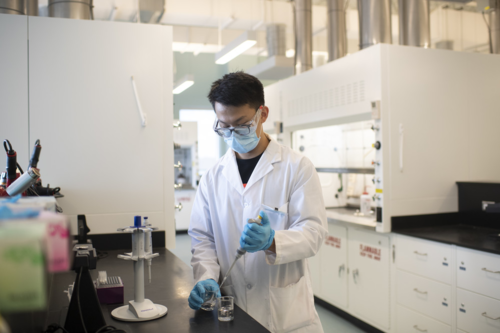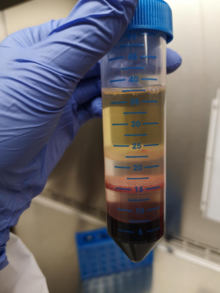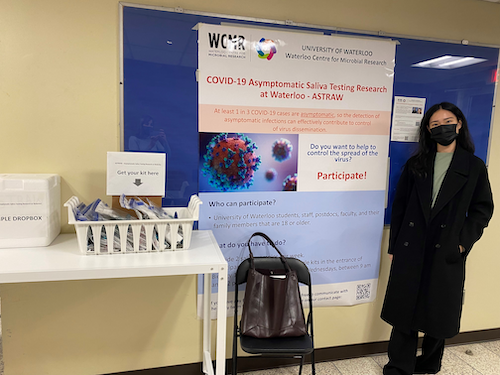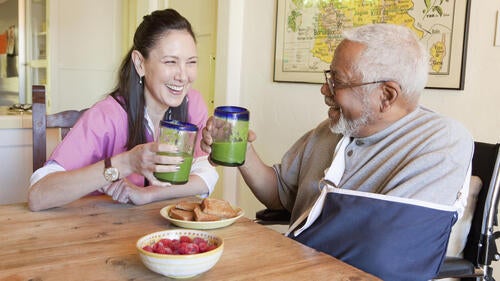The Daily Bulletin is published by Internal and Leadership Communications, part of University Communications
Contact us at bulletin@uwaterloo.ca
Submission guidelines
Editor:
Brandon Sweet
University Communications
bulletin@uwaterloo.ca

There’s still time to register for the upcoming President’s Forum taking place today at 1:30 p.m.
The President’s Forum is an opportunity for the President along with other senior members of the University to connect to the University of Waterloo staff, faculty and students to provide updates about the return to in-person experiences.
Following the update, there will be a live Q&A session.
The MS Teams link to the forum is now available. The event will commence at 1:30 p.m.
Follow along on social media at #UWforum.

This article was originally published on the Interdisciplinary Centre for Climate Change website.
The University of Waterloo is finishing their participation in an exciting new collaborative program, Climate Connect, which involved 60+ students and over 20 researchers from across the world to gather and discuss climate change.
The goals of the program were to promote international networking among students across academic career stages and to create space to share and learn about diverse perspectives on sustainability and how the climate crisis, and responses to it, are being experienced from one region to another. The Waterloo student cohort was led by Angela Carter, Associate Professor in the Department of Political Science & Balsillie School of International Affairs, and Interdisciplinary Centre on Climate Change (IC3) member. She is assisted by a team of four facilitators, Chad Walker, Lowine Hill, M. Salim Uddin and Sarah Norton.
“Thanks to Climate Connect, University of Waterloo students have learned about climate crisis impacts and responses in a truly global setting, spanning the UK, South Africa, Malawi, Sweden, and China. Even better, they are now exploring how to build on these new relationships to take effective local-to-international climate action,” Carter said. “It is inspiring to see Waterloo students leading in this innovative global partnership.”
The program started in October 2021 and has become a viable replacement for in-person networking opportunities while the challenges of pandemic restrictions on international travel persist.
"We wanted to give our students a platform to replace the international networking and engagement that was lost because of the COVID-19 pandemic," said Simon Glauser, Managing Director at the University of Waterloo’s Interdisciplinary Centre on Climate Change. “While the pandemic forced us into this model, it's also shown us that we can maintain a lot of the richness of international networking and engagement without the heavy carbon footprint associated with international travel. As well, removing the travel cost has allowed the program to be more equitable and inclusive, which only enhances the diversity of perspectives and experiences.”
Throughout the five-month experience, Waterloo students have learned the dynamics and nuances of the global climate crisis through hearing the different perspectives, opinions, and experiences of their peers from Strathclyde University in the United Kingdom, Peking University in China, Stellenbosch University in South Africa, University of Malawi in Malawi, and KTH Royal Technical Institute in Sweden.
As Simrit Dhillon, a Public Health and Psychology student, commented, “we’ve learned how challenging but worthwhile it would be to try to build a larger-scale, global system to monitor and manage these types of worldwide concerns.”
“It gives climate leaders a chance to learn about how the changing climate is manifesting itself in other parts of the world and be inspired by unique actions that those leaders are taking, which you can try in your local community. Without the fresh, external perspectives that our fellow international participants bring, I believe it may be easy for our local climate action to simply remain stagnant and uninspired. Seeing the hard work that people overseas are putting into the same cause that you care about is a strong source of much-needed motivation and inspiration in this line of work,” added Nilusha Rattansi, a Public Health student.
Overall, the value of connecting with other students around the world about the climate crisis has enabled a deeper level of critical thinking and reflection. As Philip Zuidema, a Peace and Conflict Studies and Political Science student, says: “It’s one thing to read an article, watch a TED Talk, or listen to a podcast describing climate change – it’s entirely different to be face to face with people who experience the crisis and its solutions firsthand.”

By Megan Lambe.
While we may be seeing a decline in the peak of Omicron’s transmission, COVID-19 research on campus is still very much alive; and researchers are seeking participant support.
 The Campus Serological Survey, run by Marc Aucoin and Brian Dixon, is seeking University of Waterloo students and employees 18+ to participate in a study tracking COVID-19 antibodies in individuals associated with the University of Waterloo campus. You do not currently have to be attending campus to participate, though you do have to be able to come to Health Services on campus for blood draws. The research team is especially looking for individuals who have tested positive for COVID-19 (whether they were symptomatic or asymptomatic at the time of infection).
The Campus Serological Survey, run by Marc Aucoin and Brian Dixon, is seeking University of Waterloo students and employees 18+ to participate in a study tracking COVID-19 antibodies in individuals associated with the University of Waterloo campus. You do not currently have to be attending campus to participate, though you do have to be able to come to Health Services on campus for blood draws. The research team is especially looking for individuals who have tested positive for COVID-19 (whether they were symptomatic or asymptomatic at the time of infection).
Participating in this study will help the scientific community understand how our bodies build immunity to COVID-19.
Participants will be asked to fill out a survey on medical history and social factors then provide 3 blood samples over 9 months for analysis of antibodies and memory T cell responses. This will take approximately 60 minutes of your time or less. Blood group type will be tested, and a questionnaire of risk factors will be conducted (e.g. on/off-campus housing status, time spent on campus vs. doing remote work, etc.).
Participants will be given a $5 gift card after their first test and will have a chance to win one of 10 $50 gift cards after completion of their second and third tests.
Please register at this webpage, or e-mail CovidSerologicalStudy@uwaterloo.ca for more information.

Professors Trevor Charles and Jozef Nissimov from the Faculty of Science are also seeking University of Waterloo students and employees 18+ to participate in the Asymptomatic Saliva Testing Research at Waterloo (ASTRAW) project. This project aims to determine the feasibility of a new non-invasive, saliva-based rapid test for the early detection of COVID-19 on campus, and tracks variants of concern in our community through virus genome sequencing.
Participating in this project will help researchers not only mitigate potential outbreaks on campus, but also learn more about the genomic sequence of SARS-CoV-2 and its variants.
To participate, please pick up a study kit inside the lobby of Biology 1 on Mondays and Wednesdays from 9:00 a.m. to 12 noon. Participants are asked to provide a saliva sample twice a week, on their own time, and deposit it into the drop-off box on campus in the same location the kit was picked up from. Coordination of samples and testing is being done by the Waterloo Centre for Microbial Research (WCMR).
If a sample comes back positive, the participant will be contacted and encouraged to confirm the results at a certified Ontario provincial COVID-19 testing centre or through a rapid antigen test (where possible) and monitor for the onset of symptoms.
To find out more information, or to sign up and participate, visit the study website.
Both studies have been reviewed by and received ethics clearance through a University of Waterloo Research Ethics Board.

This article was originally published on Waterloo News.
New technology could help reduce malnutrition and improve overall health in long-term care homes by automatically recording and tracking how much food residents consume.
The smart system, developed by researchers at the University of Waterloo, the Schlegel-UW Research Institute for Aging and the University Health Network, uses artificial intelligence software to analyze photos of plates of food after residents have eaten.
The sophisticated software, which examines colour, depth, and other photo features, can estimate how much of each kind of food has been consumed and calculate its nutritional value.
“Right now, there is no way to tell whether a resident ate only their protein or only their carbohydrates,” said Kaylen Pfisterer, who co-led the research with her husband, Robert Amelard, while earning a PhD in systems design engineering at Waterloo.
“Our system is linked to recipes at the long-term care home and, using artificial intelligence, keeps track of how much of each food was eaten to make sure residents are meeting their specific nutrient requirements.”
It is estimated that more than half of residents of long-term care homes are either malnourished or at risk of malnutrition.
Food intake is now primarily monitored by staff who manually record estimates of consumption by looking at plates once residents have finished eating.
Amelard, a Waterloo alumnus and postdoctoral fellow at University Health Network, said studies show the subjectivity of that process results in an error rate of 50 per cent or more. By comparison, the automated system is accurate to within five per cent, “providing fine-grained information on consumption patterns.”
Researchers collaborated with personal support workers, dietitians and other long-term care workers to develop the system, which saves time as well as improves accuracy and would ideally be added to tablet computers already used by front-line staff to keep electronic records.
“My vision would be to monitor and leverage any changes in food intake trends as yellow or red flags for the health status of residents more generally and for monitoring infection control,” said Pfisterer, now a scientific associate at the University Health Network Centre for Global eHealth Innovation.
The research team also included Heather Keller, a professor of kinesiology and health sciences, Alexander Wong, a systems design engineering professor, and students Audrey Chung, Braeden Syrnyk and Alexander MacLean.
A paper on their work, Automated food intake tracking requires depth-refined semantic segmentation to rectify visual-volume discordance in long-term care homes, appears in the journal Scientific Reports.
A message from Information Systems & Technology.
A test of the University’s emergency communication system is scheduled for Wednesday, February 2 at 11:00 a.m. Test activation and deactivation messages will be sent using the following channels:
In the event of a real emergency during this test, please contact Police Services at 519-888-4911, or ext. 22222.
Be sure to install the WatSAFE app on your device and WatSAFE Desktop Notification tool on your desktop/laptop to receive this test message, and more importantly, to stay informed of campus emergency situations. Visit the WatSAFE website for more details.
As the University prepares for a return to in-person learning activities next week, the COVID-19 website now has a comprehensive list of classes that are staying online until February 28.

"Join us for the third annual Safe Love Week," says a note from the Graduate Students Association (GSA-UW). "With our amazing partners, we have a week of programming, including educational workshops, gift bags at the Graduate House, Trivia night (with prizes to be won) and opportunities to ask anonymous Safe Love and Safe Sex questions."
Safe Love Week runs from February 14 to February 18.
Employers hosting Virtual Employer Information Sessions (VEIS) this week include PointClickCare.com, Gadze Finance, and DHS Supply Chain. Make sure to register through WaterlooWorks and check the calendar for any updates.
Wiarton Willie: The Groundhog, the Myth, the Legend
Students can visit the Student Success Office online for supports including academic development, international student resources, immigration consulting, leadership development, exchange and study abroad, and opportunities to get involved.
Instructors looking for targeted support for developing online components for blended learning courses, transitioning remote to fully online courses, revising current online courses, and more please visit Agile Development | Centre for Extended Learning | University of Waterloo (uwaterloo.ca).
Instructors can visit the Keep Learning website to get support on adapting their teaching and learning plans for an online environment.
Course templates are available within your course in LEARN to help you build and edit your content and assignment pages quickly.
The following workshops, webinars, and events are offered by the KL team (CTE, CEL, ITMS, LIB):
Employees can access resources to help them work remotely, including managing University records and privacy of personal information. Here are some tips for staying healthy while working from home.
The Writing and Communication Centre has virtual services and programs to help undergrads, grad students, postdocs and faculty members with academic writing.
Co-op students can get help finding a job and find supports to successfully work remotely, develop new skills, access wellness and career information, and contact a co-op or career advisor.
The Centre for Career Action (CCA) is currently offering virtual services only. Questions about CCA's services? Live chat or call 519-888-4047 between 8:30 a.m. and 4:30 p.m. EST, Monday to Friday.
Drop-in to Warrior Virtual Study Halls on Wednesdays from 5:30 p.m. to 7:00 p.m. Come together in this virtual space to set goals and work independently or in groups each week.
Renison's English Language Institute continues to offer virtual events and workshops to help students practice their English language skills.
If you feel overwhelmed or anxious and need to talk to somebody, please contact the University’s Campus Wellness services, either Health Services or Counselling Services. You can also contact the University's Centre for Mental Health Research and Treatment. Good2Talk is a post-secondary student helpline available to all students.
The Library will continue to focus on digital resources and consultations as we start winter term with classes primarily online, though spaces will be open for drop-in individual study space, bookable individual study rooms, drop-in access to computers and printers, book pick-up services and IST Help Desk support. Special Collections & Archives and the Geospatial Centre will be accessible by appointment. Full details on current services and hours are available on the Library’s COVID-19 Update webpage.
The Faculty Association of the University of Waterloo (FAUW) continues to advocate for its members. Check out the FAUW blog for more information.
The University of Waterloo Staff Association (UWSA) continues to advocate for its members. Check out the UWSA blog for more information.
The Sexual Violence Prevention and Response Office (SVPRO) supports all members of the University of Waterloo campus community who have experienced, or been impacted, by sexual violence. This includes all students, staff, faculty and visitors on the main campus, the satellite campuses, and at the affiliated and federated Waterloo Institutes and Colleges. For support, email: svpro@uwaterloo.ca or visit the SVPRO website.
The Office of Indigenous Relations is a central hub that provides guidance, support, and resources to all Indigenous and non-Indigenous campus community members and oversees the University's Indigenization strategy.
The Waterloo Indigenous Student Centre, based at St. Paul’s University College, provides support and resources for Indigenous students, and educational outreach programs for the broader community, including lectures, and events.
WUSA supports for students:
Peer support - MATES, Glow Centre, RAISE, Women’s Centre - Visit https://wusa.ca/peersupport to book an appointment either in person or online for the Fall term.
Food Support Service food hampers are currently available from the Turnkey Desk 24/7 in the Student Life Centre. Drop off locations are also open again in SLC, DC, DP, SCH and all residences.
Co-op Connection all available online. Check https://wusa.ca for more details.
Centre for Academic Policy Support - CAPS is here to assist Waterloo undergraduates throughout their experience in navigating academic policy in the instances of filing petitions, grievances and appeals. Please contact them at caps@wusa.ca. More information is available.
WUSA Student Legal Protection Program - Seeking legal counsel can be intimidating, especially if it’s your first time facing a legal issue. The legal assistance helpline provides quick access to legal advice in any area of law, including criminal. Just call 1-833-202-4571.
Empower Me is a confidential mental health and wellness service that connects students with qualified counsellors 24/7. They can be reached at 1-833-628-5589.
GSA-UW supports for graduate students:
The Graduate Student Association (GSA-UW) supports students’ academic and social experience and promotes their well-being.
Advising and Support - The GSA advises graduate students experiencing challenges and can help with navigating university policies & filing a grievance, appeal, or petition.
Mental Health covered by the Health Plan - The GSA Health Plan now has an 80% coverage rate (up to $800/year) for Mental Health Practitioners. Your plan includes coverage for psychologists, registered social workers, psychotherapists, and clinical counselors.
Dental Care - The GSA Dental Plan covers 60 per cent to 70 per cent of your dental costs and by visiting dental professionals who are members of the Studentcare Networks, you can receive an additional 20 per cent to 30 per cent coverage.
Student Legal Protection Program - Your GSA fees give you access to unlimited legal advice, accessible via a toll-free helpline: +1-833-202-4571. This advice covers topics including housing disputes, employment disputes, and disputes with an academic institution.
The Graduate House: Open Monday to Friday 11:30 a.m. to 6:00 p.m. - We’re open to all students, faculty, staff, and community members. The Graduate House is a community space run by the GSA-UW. Capacity is limited to 50 per cent, and Government ID and Vaccination Records will be required for all dine-in guests. Graduate students who paid their fees can still get discounts and free coffee.
Warriors vs. Laurier Blood Donation Battle. Join our “Waterloo Warriors” team on the Blood.ca website or app. #ItsInYouToGive
Healthy Warriors at Home, free online programs including Nutrition Guides, Personal Training Consults, Health Webinars, Mindfulness Courses and On-demand Fitness. Sign up now.
President's Forum, Wednesday, February 2, 1:30 p.m.
Ujima Black History Month: opening and celebration, Thursday, February 3, 12 noon.
Master of Taxation, Virtual Information Session, Friday, February 4, 9:00 a.m. Learn more about the MTax advantage. To register visit www.mtax.ca.
OHD 2022 Speaker Series kicks off with Dr. Michelle R. Weise, “Tapping into the Lifelong Learning Market”, Tuesday, February 8, 10:30 a.m. Register now on Portal.
On this week's list from the human resources department, viewable on the UWaterloo Talent Acquisition System (iCIMS):
Secondments/Internal temporary opportunities
Affiliated and Federated Institutions of Waterloo opportunities
https://uwaterloo.ca/careers/other-opportunities
The Daily Bulletin is published by Internal and Leadership Communications, part of University Communications
Contact us at bulletin@uwaterloo.ca
Submission guidelines
The University of Waterloo acknowledges that much of our work takes place on the traditional territory of the Neutral, Anishinaabeg, and Haudenosaunee peoples. Our main campus is situated on the Haldimand Tract, the land granted to the Six Nations that includes six miles on each side of the Grand River. Our active work toward reconciliation takes place across our campuses through research, learning, teaching, and community building, and is co-ordinated within the Office of Indigenous Relations.